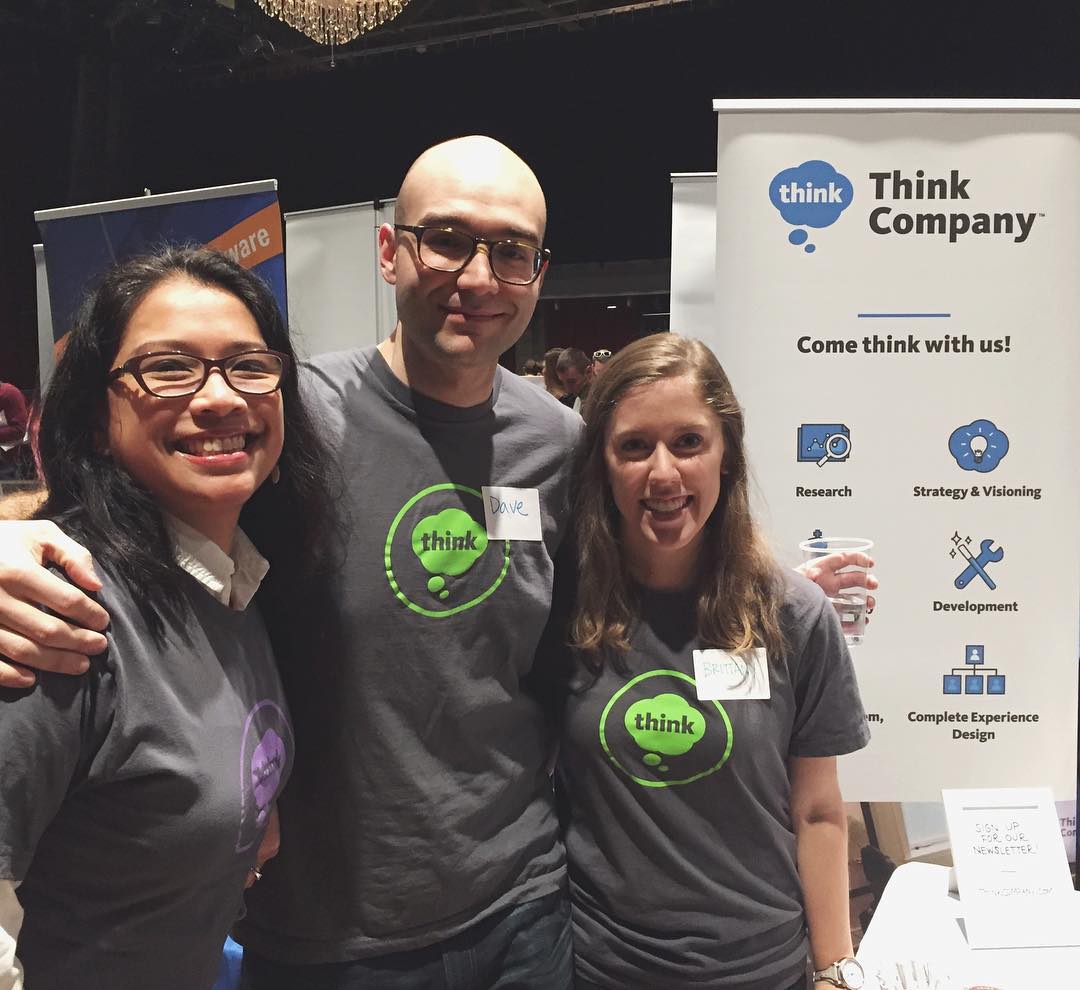I spent three hours a few weeks ago standing behind Think Company’s table at Technical.ly’s NET/WORK Suburbs 2017 job fair, talking to a number of interesting, engaging, smart people. I had some thoughts that I wanted to share while they were still fresh in my mind.
To the person visibly steeling their courage before marching up to the table:
I know that approaching a potential employer’s table can be nerve-wracking. But we’re not at the event because we want to get out there and judge people. We’re at the event because we’re actively looking for great people. We’re not looking for excuses to knock anyone down. We’re on your side!
By taking the time to come out to an event and talk to us, you’ve already predisposed us to think you’re a proactive person who goes out and looks for opportunities. We’re looking for the best in people. Charge right up to the table with confidence; we’re happy you are coming to see us!
To the person who said, “You, too!” — then blushed furiously:
“Good luck on your job search!” I said. Then you said, “You, too!” before blushing furiously. I could see your mental facepalm.
Please believe me that this is not even the tiniest fraction of an issue, and if I could save you all the pain, I would.
Many developers (and designers, too!) are smart, nerdy people with a lot going on in their heads that they have a hard time getting out of their mouths. If you say something goofy and dumb, all I think is, “Hey, we have a lot in common!”
If you are completely smooth and polished, I’ll just spend the first part of our conversation wondering if you’re a salesperson anyhow. Please, please don’t spend any time worrying about that.
To the second career folks:
You know what you can learn in an intensive 12 weeks at a coding bootcamp? You can learn a lot of incredibly useful, relevant skills. But what you can’t learn? You can’t learn how to collaborate with a team. You can’t learn how to be proactive in a highly-regulated environment. In 12 weeks, you can’t learn how to exceed a client’s expectations, then do that again, then keep on going until you’ve built the trust that is the cornerstone of a successful engagement.
You can learn all those things as a Realtor. Or a nuclear engineer. Or a shift manager at a quick-service restaurant (all folks I talked to at the event). You can learn all those things running a daycare. You can learn all of those things being a lead parent, too.
I love second-career folks, and when I see on your resume that you’re changing career paths, I look for evidence that you were good at your previous job. What were the challenges you solved? What did you learn? What superpowers does that background give you?
To the bootcamp students:
Many of the folks I talked to were bootcamp students. Coding bootcamps are great!
A piece of gentle advice here. Sometimes, bootcamp students (not you, of course) will say, “I’ve been working with Ruby! and React!” and then they’ll pause for a brief moment to study my reaction.
I have to wonder if they’re waiting for me to burst out in song: “At LAST! A React developer! And what’s that, you say? RUBY? My long nightmare is over at last!”
I’m sorry to tease; that coding bootcamp is teaching you useful, recent and relevant skills. I really do need those kind of developers.
But knowing the skills gets you to level zero as a developer. Some organizations (they are rare, but they exist) are able to hire you at level zero. But I, and many other organizations, can only talk seriously about hiring you for a junior position once you’re at level two.
Things that make a “level two” developer:
- You have collaborated with a team of three or more people to create a working system.
- You have integrated with a big, complicated and confusing enterprise system.
- You have reviewed, worked with and extended other developers’ code.
- You have successfully worked with developers that know more than you about the system at hand, and non-technical users that know less than you, fitting into the team to carry the work forward.
- You are cheerful and productive when faced with a complex problem.
How to solve the knotty can’t get experience without a job, and can’t get a job without experience problem?
There’s no single answer to this. But two pieces of the puzzle are open source projects and meetups, like Hacktoberfest and Code for Philly. Show us your Git commits or tell us your stories about how you collaborated with others to solve tough problems, and we’ll be all ears.
By the way: does “improving the documentation” count on a project? You bet it does. Even if you don’t write a line of code! And showing up to improve the documentation is sorely-needed in almost every open-source project.
See you at the next event!
At Think, we firmly believe that our people (individually) and our teams (made of great individuals) are the best around, and we invest in them. That’s why our about us page has a long list of “best places to work” trophies on it. We’re constantly looking for folks at each stage of their career to teach and to learn from.
We’ll be out there behind the table — our next appearance will be at Delaware Innovation Week’s Dev Day on Wednesday, Nov. 8 — and we hope to see you there!
RSVP







